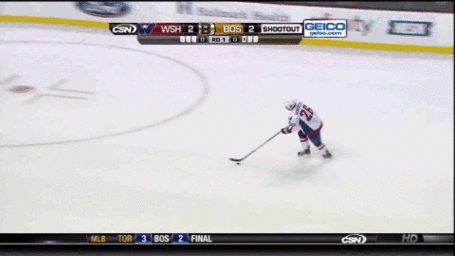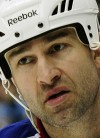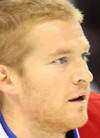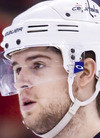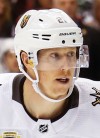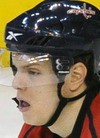
Just of a couple weeks ago the Washington Capitals' season came to a close. While it was a(nother) disappointing and emotional letdown, by now we've had a chance to take some deep breaths and look back on the season rationally and dispassionately. There was some good, some bad, and some ugly. Next season there will be some new faces, but the majority of this team will return. Join us to take a look at how the season unfolded, and speculate on where the team goes from here.
Q1: A lot happened this year: new few faces came in, old faces went out, the team went from Cup Contender to playoff bubble, and then ultimately went just as far as they’ve been in the Ovechkin-era. What are your general thoughts on the season?
Rob Parker: Given the talent and the high hopes that everyone had for this season in training camp, this has to be considered a disappointing season. The Caps failed to win the division in a year in which the division was as weak as it has ever been. They never really looked like legit Cup contenders, and the end-of-year stat sheet is littered with disappointing performances, some injury related, others not. Obviously any time a coach gets fired it’s a pretty clear sign that things didn’t go according to plan. That said, you have to adjust expectations as new evidence is provided, and by the time the playoffs came around the evidence was that the Caps were not a great team. Given that, I am pleasantly surprised by how they played in the playoffs. They hung tough with two very good teams, defeating one of them. They didn’t let bad bounces snowball into blowouts, or tough losses snowball into 3 game losing streaks.
J.P.: The season wasn’t without successes, but certainly wasn’t a success. After a hot start, things fell apart, the coach was fired the offense struggled, the stars struggled, the fan base struggled... and then it all came together for an unexpected playoff run, making it as hard a season to nail down, analytically, as I’ve ever seen. They underachieved, but in retrospect there were obvious, gaping holes in the roster that never were addressed and so the degree to which they underachieved is probably overstated in many places. They implemented a system that turned every game into a 50/50 proposition, which was great against better teams (like Boston and New York), but why would you want to give Winnipeg or the Hurricanes that same 50/50 shot when you’re clearly the superior squad (on paper, at least)? I don’t think they "learned how to play the right way" or anything like that, but at the same time, the victory over the Bruins was more than just a hot Braden Holtby - Bruce Boudreau’s Caps don’t win that series, even with that goaltending.
Ultimately, I give a lot of credit to Dale Hunter, who had never coached above the CHL level before, put the plane together while it was already rolling down the runway, and knocked off the defending Cup champ with their Jack Adams-winning coach then pushed the top team in the Conference to a Game 7 in a series they could have won. But less of that credit is for X’s and O’s than what he did for the team on the mental side of the game. Dale Hunter un-screwed a lot of things that were screwed up with the Washington Capitals and leaves them on the right track moving forward, and that’s the season’s biggest success.
Becca H: With all of the ups and downs, twists and turns, this season ended up being as much of a rollercoaster - if not more of one - than many of the seasons in Caps’ history, particularly in the post-lockout "Ovechkin" era. It felt like every two to three months expectations had to be tempered to the point where by the end of the year you didn’t know if you should be happy that the team got as far as they did or disappointed that they didn’t go far enough. And the fact is that if you look at the season from where it began and from where the previous season left off, losing in the second round yet again can’t be viewed as anything less than a disappointment.
But every season is different, things change, sports are unpredictable and very few teams start the way they end - so ultimately I view this year as, if not a success, at least a step in a positive direction. Yes, the Caps went from contenders to a team that barely made the playoffs but the process they went through to get to the postseason - and then the way they conducted themselves once they got there - is something that ultimately feels like a step in the right direction the way previous early exits have not.
Pepper: This past season and playoffs played out they way I once thought that the 2010-11 season and playoffs would have unfolded. Following the infamous collapse to the eighth-seeded Habs in the spring of 2010, and all the chatter in its wake about how little regular season dominance mattered, I had scripted then what just happened in 2011-12, perhaps minus a coaching change: a season-long struggle to make the post-season, stumbling to the finish, followed by a team galvanized by that shocking failure to make things right and beat the powerhouses of the Conference at that same tight-checking, shot-blocking, grind-it-out coin-flip of a game.
Instead, the 2010-11 campaign looks more like the aberration to me, as it required another season and a new, legendary, and respect-commanding voice behind the bench to make the necessary playoff adjustments.
Kareem E.: There is a segment of the fanbase that feels this season did not meet expectations in any way. I’m one of them. Six months ago pundits were talking about LA and Washington in the finals. Well, LA is going to hold up their end of the bargain; meanwhile, segments of the Caps fanbase are tickled that we beat the Bruins and took the Rangers to seven games. Phooey! We didn’t win the division, choked away yet another playoff series and underachieved again with a star-studded roster that has yet to deliver a third round appearance. Sure, it was nice to see the boys collectively show a little resolve in the playoffs, and for Holtby to step up when the team needed him, and for Karl Alzner to continue evolving into an elite defenseman, but those nice facts do not absolve the team of its failure to meet expectations.
Q2: The team obviously did not live up to the lofty expectations that fans and pundits had in training camp, so what went wrong?
JP: Boudreau, it seems, took this team as far as he could. It’s exactly what we wrote after the Tampa loss a year ago:
"[E]ither Bruce Boudreau had the wrong message, or he had the right one and was incapable of getting his players to execute it. Whichever it was, it's ultimately a poor reflection upon the coach - being an effective communicator and motivator is every bit as important as being an effective tactician and strategist here."
After disappointing finishes, a schizophrenic identity change during the 2010-11 and an inability to coax top performances out of top players, it’s not entirely surprising that at the first sign of turbulence, Boudreau lost the team. Maybe a different coach or a different team could have ridden out the cold streak, but not this one.
Of course, there is that third possibility regarding Boudreau and, as we noted then, it's potentially the most troubling of all - "Perhaps it's the players - specifically the core players, in whom so many years and dollars are invested - who are simply incapable of receiving the message, insistent on freelancing and system-allergic." Hmm...
RP: I think a lot of people, ourselves included, overestimated how much talent is on the roster. The general sentiment was that this was a team that could still score like it was 2009-10, but chose to play a more defensive style. We should have known that wasn’t the case, given how much time we’ve spent explaining to others that the great systems switch of 2010 was precipitated by a lack of scoring, rather than causing the lack of scoring, but it was still a little bit of a shock to see how few impact players this team has in the offensive part of the game.
JP: No question. There are plenty of complementary pieces in D.C., but how many real playmakers, offensively?
RP: Yeah, the few offensive difference-makers this team does have all spent a large part of the season injured, or had statistically disappointing years. With less scoring depth, this team could not afford to have Green and Backstrom wearing suits, and Ovechkin, Semin, and Carlson having disappointing regular seasons all at the same time. Then you add a huge systems adjustment to a completely new, and more defensive, system and the team was never able to get going and put up a lot of points in a short period of time, after the 7-0 start.
BH: I don’t necessarily buy that the team isn’t as good as people think; to me, saying that feels like kind of a cop-out, a way to keep expectations low when the team ultimately disappoints us.
There’s a reason all of the experts and pundits were predicting they’d win over the summer and scratching their heads at what the team did over the course of the season. I still believe that the "star players" are, when healthy and at their best, among the most talented in the NHL - put them up against any of the teams considered to be "top" teams in the NHL (and definitely any of the teams left in the playoffs) and they match up or exceed any of them. That the top-end talent spent a lot of the season either struggling or injured was in my mind a big part of why they just couldn’t get it together. When you’re having to be carried by your third- and fourth-line guys for long stretches of time for whatever reason, guys with tons of heart but maybe not as much talent, you won’t get very far.
But it also seemed as though this unofficial motto that "the regular season doesn’t matter" became a little too entrenched in the team - which is part of why they needed a coaching change and ultimately a culture change. Coasting through the regular season is hard enough when Ovechkin is Ovechkin and Backstrom is healthy; trying to do so when they’re not is a whole other issue, and it’s why the Caps had to claw their way into the postseason.
Q3: So where did the Caps improve, if anywhere? If they took a step forward this season, what was it?
RP: A lot of bad habits seem to be broken. Time will tell if that holds, but this team played more focused and defensively committed hockey once Dale Hunter had his system fully implemented. The ever-elusive mental toughness also seemed to show up, especially in the playoffs. It’s hard to imagine the 2009-11 Capitals coming back from the game 3 or game 5 losses against the Rangers, and the team set a league record by winning 4 straight games following a playoff loss. That they didn’t lose back-to-back games in the playoffs is a great sign, especially given how quickly the Tampa Bay series spiraled out of control last season.
JP: Agreed. This team was more resilient than in years past, and while some of that may be a function of younger players maturing, the coach’s demeanor certainly played a huge role. Boudreau’s high highs and low lows and everything in between had to wear on the team after a while, and Hunter’s style was, at the very least, a refreshing change.
Pepper: I agree that Hunter’s "un-screwing" of the Caps was the real accomplishment this time around, and real progress for this team. I also believe that Hunter’s approach, as we saw it this season, would have represented an over-correction in the long term. Stripping the screws, or something like that. But it was a culture shock that paid big dividends when it really mattered, and hopefully the Caps’ next bench boss can utilize it to everyone’s advantage.
BH: Also agree - the resiliency this team showed toward the end of the year and through the two playoff rounds was both unexpected and exciting. In the past those heartbreaking losses that tore at us as fans would have demolished the team as well; this year it seemed as though the only people wringing their hands and hoping the sun would come up the next day were those of us watching at home.
Q4: The biggest storyline from the season was the coaching change. What are your thoughts on the change, having seen how it played out? Did it work out as you expected it to?
BH: The Caps let Boudreau go right about the time I thought he should have gone - that loss to Buffalo felt so eerily similar to the one that had cost Glen Hanlon his job a few years back, right down to the post-game press conference with a coach who clearly had run out of ways to get this team to win. But the hiring of Dale Hunter was a scary one for me, because it felt like it was putting a legacy of one of the franchise’s great players and captains in jeopardy, a more nostalgic choice rather than one that suited the team.
In some ways it worked out better than I had hoped, in others it was worse than I feared. Hunter seemed to be angering people within the room, managing the personnel in strange ways and handing out ice time and game jerseys with a seemingly haphazard hand - still, it’s hard to deny that the team he left was more focused, more disciplined and more cohesive as a unit than the one he inherited. That he called it a day after the second-round loss really wasn’t surprising, and hopefully by doing so he left an imprint on his team and kept his legacy mostly in tact.
RP: Following the loss to Tampa Bay I said that the team needed a new voice behind the bench, and that if that voice happened to be Dale Hunter then a lot of bad habits would be broken, even if he didn’t prove to be a great coach. I’m not willing to pile on and say he was a terrible coach, like many others have. He clearly was not coaching a possession/Corsi-motivated game, so he’ll take heat from the stats community. But he did have his vision of how the game should be played and ultimately did a good job of getting the players to execute that vision. I didn’t expect it to be a one-and-done situation, but with the team learning to play a grittier style and taking the top two seeds in the Eastern Conference to 7 games, I think it worked out about as well as I expected it to.
JP: With 20/20 hindsight, it feels like Dale Hunter was doing George McPhee a favor by coaching the Caps for the rest of the season once the Boudreau situation became untenable; he never truly seemed comfortable here and the haste with which he made his decision once the season ended was... something. For the most part, I consider The Hunter Era to be little more than triage (not sure it’s fair to expect much more from a guy in that situation), and it nearly turned into something spectacular... but could have just as easily ended up on the outside-looking-in when the music stopped and the eight teams in the East readied for the playoffs.
Pepper: Again, I think it played out as best as it could: ironing out a lot of the wrinkles on this team. It looks now like a favor to me as well, and one that probably saved McPhee’s job . . . at least until we see the 2012-13 results of the sixth Caps head coach to pace the bench during this general manager’s tenure.
KE: No, this didn’t work out as I expected. At all. Hunter oftentimes looked clueless, didn’t maximize the use of his line-up or match his style of play to the team’s strengths. While there were aforementioned benefits to his tenure - and certainly his coaching and style should be credited in helping the Caps win a round - with hindsight there was no way he was going to lead the Caps to the promised land.
Q5: And before Caps fans could even ponder the future of the Dale Hunter-led Caps, he stepped down. Where should the Caps go from here? Do you expect any of the lessons from Dale Hunter’s brief tenure to persist, or does the next bench boss need to have a similar attitude and demeanor in order to maintain that elusive mental toughness?
RP: I sure hope the team keeps a lot of the lessons they picked up under Hunter, specifically the commitment to details in the defensive end and the mental toughness. Whether they do or not is anybody’s guess. Going forward, I think the team needs a coach that has NHL experience. George McPhee has gone with inexperienced coaches (at the NHL level) with his previous hires, to mixed results. A coach with (preferably recent) NHL experience would avoid the learning curve that Hunter seemed to deal with and, more importantly, instantly carry credibility and demand respect when he steps into the locker room.
JP: Co-signed. I know enough to know that I don’t know enough to know who the next guy should be, but I’d be surprised (and probably disappointed) if it wasn’t someone with recent NHL head coaching experience for the reasons noted above. Add in the fact that George McPhee’s future might very well be riding on this hire, and given that it’s harder to miss big on a recycled coach who has had some success than a(nother) rookie and you’d think the pool of candidates is limited. But priority number one for the new guy - perhaps even above winning, as crazy as that sounds - is maximizing the team’s return on investment in Alex Ovechkin. If they get someone who can do that, I’m betting everything else falls into place.
BH: Also agree that NHL experience is, at this point, a must - bringing in a green coach is one thing when you’ve got a lot of young guys who are still growing into their roles, it’s another when you don’t have many other options or much time. But when the team’s window starts to shrink and you need to find The Guy to take them to that next level, it has to be someone who has been there before in some capacity - not necessarily in terms of a Cup ring (although it wouldn’t hurt) but at least someone who isn’t learning on the fly. He needs to step in at training camp and take over this team right away, and to do so he needs instant credibility.
I do think the Caps will take something away from Hunter about mental toughness and playing as a team, but having a coach who maintains and drives home that message nightly can’t hurt, either - for any team, but especially a team like this that has been prone to fragility and making the same mistakes over and over again.
Pepper: Not much to add here. I’d really like to see a coach with Cup ring, as a head guy or an assistant. I think there’s a respect factor there that is still critical to the success of these Caps.
Q6: Looking at the team today, are the Caps closer to or further away from contending for a Cup than they were after the Pittsburgh Game 7 loss?
JP: Such a tough question. The team that lost to the Pens got tweaked a bit and then steamrolled through the regular season en route to a Presidents’ Trophy... and then Montreal happened. Nonetheless, 2009-10 was the most-dominant team they’ve had with the most-dominant players they had. That was their last best chance, and without knowing who’s coaching this team or what the roster will look like going forward, it’s hard to say they’re in better shape right now than they were after that loss to Pittsburgh (though they do seem to be back headed in the right direction).
RP: It’s real hard to say. They have less talent in the forward corps, but more talent and experience on the defensive corps. The goaltending is probably a little better because of experience, but not a whole lot better. The 2009 team looked to be fast risers and seemed on the cusp, and that obviously didn’t work out. This team probably won’t be favorites next year, pending any major off-season additions, but the commitment to defense and mental toughness, should it carry forward, makes the team better poised to survive a long playoff run. Trying to ignore hindsight, and the fact that we know the Caps didn’t win in either of the years following the Pens loss, and I think that team was closer to a Cup based on pure talent. But I don’t think that team is far off (especially if Green can stay healthy, a homegrown Alzner, Carlson, Green, Schultz, Orlov is a huge advantage over the ‘09 team), and it remains to be seen what happens in the off-season.
BH: Even if the regular season was a bust, it’s hard not to think that the team took a step or two forward this year. Are they closer than they were in 2009-10? Hard to say - I’d like to think they are, because this time around they have two groups of young homegrown talent that has been through the wars and sees what they need to do to win, but I’d imagine at the very least they’re just as close. The window hasn’t closed on this team. Yet.
Pepper: Second Rob’s point re: "commitment to defense and mental toughness . . . ." But of course this team still lacks center depth in a serious way, as well as on defense. The organization was lucky that it suffered no major injuries to the blueline in this spring’s playoffs.
KE: The Caps of 2009-10 - full of bad habits and selfish play - were closer to a Cup than they are today. In 2009-10 they played with confidence, didn’t know how undertalented they were on defense, and, with all due respect to Eastern Conference finalist Carolina, were one home game away from essentially booking a Stanley Cup visit with Detroit., where anything could have happened The Caps today are better on defense, but overall are not exceptional in any category and still have glaring lineup weaknesses. They’re really just one of ten or so teams that can win the Cup in any given year if two or three of their players get hot.
Q7: So where does the team go from here? What do they need to add or change to be more competitive next year?
RP: As strange as it sounds given the reputation of the Washington Capitals over the last 4-5 seasons, this team needs help in the top-6 forwards. At various times pundits have pointed at the Capitals’ ability to play defense or their goaltending. The defense has been a valid concern, if overblown, but the real problem for this team in each of the last 4 playoff exits has been secondary scoring. The Caps didn’t get enough contributions from the top-6 when they lost to Pittsburgh, and again against Montreal, and again against Tampa Bay, and then again this year. It’s nice when the bottom-6 guys pitch in, but they are bottom-6 guys for a reason. Unless the top two lines both contribute it’s tough to make a playoff run. Hopefully the Caps are able to add some top-6 talent this summer because that’s where they have the most room for improvement.
BH: Center depth and/or secondary scoring to fill the void that will be left by Semin’s likely departure.
And while it’s not the highest priority, I’d like to see GMGM bring in someone to provide a veteran presence - if Knuble and Halpern are gone, and the likelihood is that at least one of them will be (and probably both), they still need that voice that’s been around and can give the younger guys perspective and the occasional kick in the pants the team needs. Ovechkin and friends aren’t kids anymore but they’re also not grizzled veterans who, when they talk, everyone listens. Not yet, anyway. Knuble speeches in particular have become legend for the way they fired up this team - if he’s gone, someone needs to take on that role.
JP: What they do depends in part on how far back towards the Boudreau Caps the pendulum swings in terms of the new coach’s philosophy, but they unquestionably need more top-six talent. I’d also look for a little more speed on the back-end, and, of course, depth down the middle. Busy will be the summer of McPhee.
KE: For starters, they can stop missing open nets in playoff games. From a roster standpoint, my very astute colleagues pointed out that the Caps need a lot of help in numerous areas: offensive skill, defensive speed, leadership, a new coach. I am unsure that it can all be sufficiently addressed in one offseason. But the Caps should - in theory - be more competitive next year. There is too much talent on this roster to not be a 100 point regular season team.





